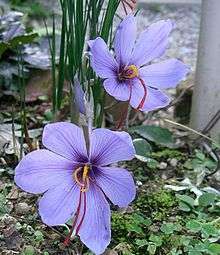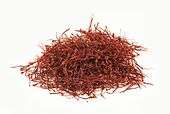Crocus sativus
| Saffron crocus | |
|---|---|
 | |
| C. sativus blossom with crimson stigmas | |
| Scientific classification | |
| Kingdom: | Plantae |
| (unranked): | Angiosperms |
| (unranked): | Monocots |
| Order: | Asparagales |
| Family: | Iridaceae |
| Subfamily: | Crocoideae |
| Genus: | Crocus |
| Species: | C. sativus |
| Binomial name | |
| Crocus sativus L. | |
| Synonyms[1] | |
| |
Crocus sativus, commonly known as saffron crocus, or autumn crocus,[2] is a species of flowering plant of the Crocus genus in the Iridaceae family. It is best known for the spice saffron, which is produced from parts of the flowers.
The cormous autumn-flowering perennial plant species is unknown in the wild.[2] Human cultivation of saffron crocus and use of saffron is known to have taken place for more than 3,500 years and spans different cultures, continents, and civilizations, see history of saffron.
Gallery
 Illustration from Köhler's Medizinal-Pflanzen (1897)
Illustration from Köhler's Medizinal-Pflanzen (1897) Flower's profile, Serra de Casteltallat, Catalonia
Flower's profile, Serra de Casteltallat, Catalonia

See also
Topics related to saffron:
References
- ↑ "The Plant List: A Working List of All Plant Species". Retrieved 23 April 2015.
- 1 2 USDA GRIN Taxonomy, retrieved 23 April 2015
External links
![]() Media related to Crocus sativus at Wikimedia Commons
Media related to Crocus sativus at Wikimedia Commons
This article is issued from Wikipedia - version of the 10/14/2015. The text is available under the Creative Commons Attribution/Share Alike but additional terms may apply for the media files.